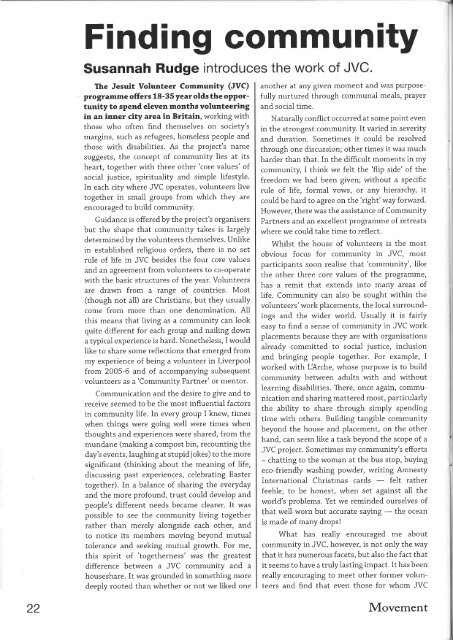Movement 134
You also want an ePaper? Increase the reach of your titles
YUMPU automatically turns print PDFs into web optimized ePapers that Google loves.
I<br />
Finding community<br />
Susannah Rudge introduces the work of JVC.<br />
The Jesuit Volunteer Community (JVC)<br />
programme offers 18-35 yearoldsthe opportunity<br />
to spend eleven months volunteering<br />
in an inner city area in Britain, working with<br />
those who often find themselves on society's<br />
margins, such as refugees, homeless people and<br />
those with disabilities. As the project's name<br />
suggests, the concept of community lies at its<br />
heart, together with three other 'core values' of<br />
social justice, spirituality and simple lifestyle.<br />
In each city where JVC operates, volunteers live<br />
together in small groups from which they are<br />
encouraged to build community.<br />
Guidance is offered by the project's organisers<br />
but the shape that community takes is largely<br />
determined by the volunteers themselves. Unlike<br />
in established religious orders, there is no set<br />
rule of life in JVC besides the four core values<br />
and an agreement from volunteers to co-operate<br />
with the basic structures of the year. Volunteers<br />
are drawn from a range of countries. Most<br />
(though not all) are Christians, but they usually<br />
come from more than one denomination. A11<br />
this means that living as a community can look<br />
quite different for each group and nailing down<br />
a typical experience is hard. Nonetheless, I would<br />
like to share some reflections that emerged from<br />
my experience of being a volunteer in Liverpool<br />
from 2005-6 and of accompanying subsequent<br />
volunteers as a'Community Partner' or mentor.<br />
Communication and the desire to give and to<br />
receive seemed to be the most influential factors<br />
in community life. In every group I knew, times<br />
when things were going well were times when<br />
thoughts and experiences were shared, from the<br />
mundane (making a compost bin, recounting the<br />
day's events, laughing at stupid jokes) to the more<br />
significant (thinking about the meaning of life,<br />
discussing past experiences, celebrating Easter<br />
together). In a balance of sharing the everyday<br />
and the more profound, trust could develop and<br />
people's different needs became clearer. It was<br />
possible to see the community living together<br />
rather than merely alongside each other, and<br />
to notice its members moving beyond mutual<br />
tolerance and seeking mutual growth. For me,<br />
this spirit of 'togetherness' was the greatest<br />
difference between a JVC community and a<br />
houseshare. It was grounded in something more<br />
deeply rooted than whether or not we liked one<br />
another at any given moment and was purposefully<br />
nurtured through communal meals, prayer<br />
and social time.<br />
Naturally conflict occurred at some point even<br />
in the strongest community. It varied in severity<br />
and duration. Sometimes it could be resolved<br />
through one discussion; other times it was much<br />
harder than that. In the diffrcult moments in my<br />
community, I think we felt the 'flip side' of the<br />
freedom we had been given; without a specific<br />
rule of life, formal vows, or any hierarchy, it<br />
could be hard to agree on the 'right'way forward.<br />
However, there was the assistance of Community<br />
Partners and an excellent programme of retreats<br />
where we could take time to reflect.<br />
Whilst the house of volunteers is the most<br />
obvious focus for community in JVC, most<br />
participants soon realise that'community', like<br />
the other three core values of the programme,<br />
has a remit that extends into many areas of<br />
life. Community can also be sought within the<br />
volunteers' work placements, the local surroundings<br />
and the wider world. Usually it is fairly<br />
easy to find a sense of community in JVC work<br />
placements because they are with organisations<br />
already committed to social justice, inclusion<br />
and bringing people together. For example, I<br />
worked with LArche, whose purpose is to build<br />
community between adults with and without<br />
learning disabilities. There, once again, communication<br />
and sharing mattered most, particularly<br />
the ability to share through simply spending<br />
time with others. Building tangible community<br />
beyond the house and placement, on the other<br />
hand, can seem like a task beyond the scope of a<br />
JVC project. Sometimes my community's efforts<br />
- chatting to the woman at the bus stop, buying<br />
eco-friendly washing powder, writing Amnesty<br />
International Christmas cards felt rather -<br />
feeble, to be honest, when set against all the<br />
world's problems. Yet we reminded ourselves of<br />
that well-worn but accurate saying the ocean<br />
-<br />
is made of many drops!<br />
What has really encouraged me about<br />
community in JVC, however, is not only the way<br />
that it has numerous facets, but also the fact that<br />
it seems to have a truly lasting impact. It has been<br />
really encouraging to meet other former volunteers<br />
and find that even those for whom JVC<br />
22 <strong>Movement</strong>

















